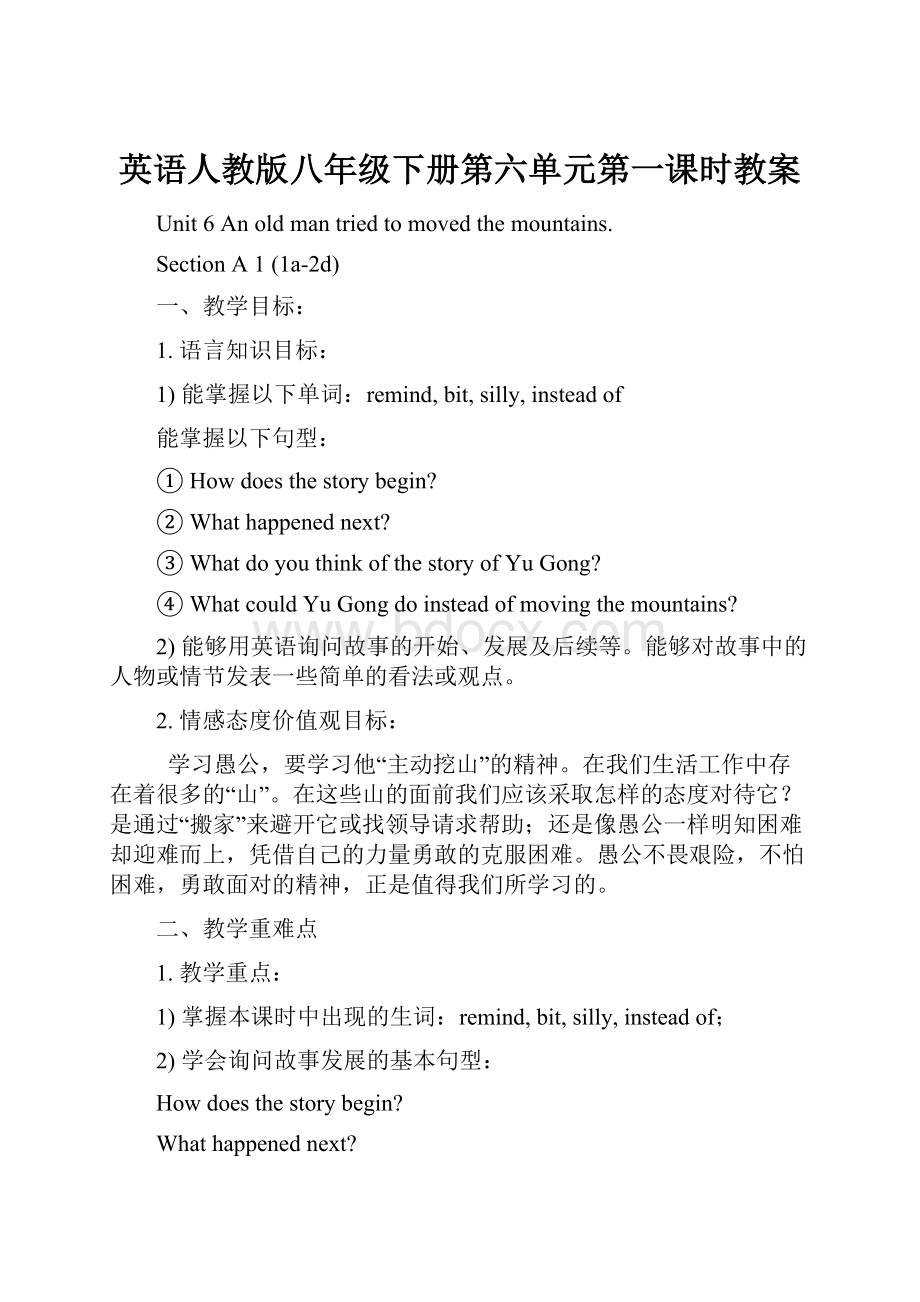英语人教版八年级下册第六单元第一课时教案.docx
《英语人教版八年级下册第六单元第一课时教案.docx》由会员分享,可在线阅读,更多相关《英语人教版八年级下册第六单元第一课时教案.docx(19页珍藏版)》请在冰豆网上搜索。

英语人教版八年级下册第六单元第一课时教案
Unit6Anoldmantriedtomovedthemountains.
SectionA1(1a-2d)
一、教学目标:
1.语言知识目标:
1)能掌握以下单词:
remind,bit,silly,insteadof
能掌握以下句型:
①Howdoesthestorybegin?
②Whathappenednext?
③WhatdoyouthinkofthestoryofYuGong?
④WhatcouldYuGongdoinsteadofmovingthemountains?
2)能够用英语询问故事的开始、发展及后续等。
能够对故事中的人物或情节发表一些简单的看法或观点。
2.情感态度价值观目标:
学习愚公,要学习他“主动挖山”的精神。
在我们生活工作中存在着很多的“山”。
在这些山的面前我们应该采取怎样的态度对待它?
是通过“搬家”来避开它或找领导请求帮助;还是像愚公一样明知困难却迎难而上,凭借自己的力量勇敢的克服困难。
愚公不畏艰险,不怕困难,勇敢面对的精神,正是值得我们所学习的。
二、教学重难点
1.教学重点:
1)掌握本课时中出现的生词:
remind,bit,silly,insteadof;
2)学会询问故事发展的基本句型:
Howdoesthestorybegin?
Whathappenednext?
3)学会表达故事中的人物或情节,并发表一些简单的看法或观点。
Whatdoyouthinkof/aboutthestoryofYuGong?
Ithinkit’salittlebitsilly.
Istilldon’tagreewithyou.
2.教学难点:
学会表达故事中的人物或情节,并发表一些简单的看法或观点。
三、教学过程
Step1Leadin
1.播放动画片《寓公移山》的视频,导入本单元主题。
T:
What’sthenameofthestory?
S1:
It’sYuGongmovesamountain.
S2:
It’satraditionalChinesestory.
T:
DoyouknowothertraditionalChinesestories?
S1:
NeZhaConquerstheDragonKing
S2:
MagicBrushMaLian
S3:
Chang’eFliestotheMoon
…
Step2Presentation
1.引导学生们学习生词。
让学生们看大屏幕来学习本课时的生词。
onceuponatime,shoot,stone
2.Trytorememberthenewwords.
Step3Writing
1.Lookatthepicturesin1a,thenreadthenamesofthestoryinthebox.
2.Ssdiscusswiththeirpartnersandmatchthenamesofthestorieswiththepictures.
JourneytotheWestbYuGongMovesaMountaind
HouYiShootstheSunsaNuWaRepairstheSkyc
Step4Listening
1.T:
TellSstheywillhearagreatChinesetraditionalstory.Listenandseewhoknowthenameofthestory.
2.PlaytherecordingfortheSstolisten.
3.Sswhoknowthenameofthestorymayhandup.
4.Playtherecordingagain.LetSscheckthefactstheyhear.
5.Checktheanswers.
____Thetwomountainswereveryhighandbig.
____Averyoldmantriedtomovethemountains.
____AmantoldYuGongthathecouldneverdoit.
Step5Pairwork
1.Readthequestionsintheboxin1c.
2.Ssdiscussthequestionswiththeirpartners.
3.Letsomepairsaskandanswerthequestions.
e.g.A:
Howdoesthestoryhappen?
B:
Thereweretwoverytallmountainsinfrontoftheirhouse.
A:
Whathappenednext?
B:
Averyoldmantriedtomovethemountains.
A:
Wherewouldtheyputalltheearthandstonefromthemountains?
B:
Theywouldputthemintothesea.
Step6Listening
Workon2a:
T:
Let’scontinuetolistentothestory.
1.Lookatthepicturesin2a.Discussthethingstheyaregoingtodo.Whenyoulistentothestory,pleasenumberthepictures.
2.PlaytherecordingfortheSstolistenandnumberthepictures.
3.Playtherecordingagaintochecktheanswers.
Workon2b:
1.LetSsreadthesentencesbelow.ExplainsomemainsentencesfortheSs.Makesuretheyknowwhattodo.
2.PlaytherecordingfortheSstocirclethecorrectwordsinthebrackets.
1)AmansawYuGongandhis(children/family)whentheywereworkingonmovingthemountains.
2)HetoldYuGonghecouldneverdoitbecausehewasoldand(poor/weak).
3)Assoonasthemanfinished(talking/speaking),YuGongsaidthathisfamilycouldcontinuetomovethemountainsafterhedied.
4)Finally,agodwassomovedbyYuGongthathesent(two/three)godstotakethemountainsaway.
5)Thisstoryremindsusthatyoucannever(know/see)what’spossibleunlessyoutrytomakeithappen.
3.Playtherecordingagaintochecktheanswers.
Answers:
1.children2.weak3.talking4.two5.know
Step7Pairwork
1.TellSstomakeastorychain.Sstellthestoryonebyonewiththepicturesin2a.
2.LetsomeSstellthestorytotheclass.
3.Seewhichgroups’storyisbetter.
Step8Role-play
1.ReadtheconversationsandLetSsreadaftertheteacher.
2.AskSstorole-playtheconversationingroups.
Somemainpoints:
(1)1.Thisstoryremindsusthatyoucanneverknowwhat’spossibleunlessyoutrytomakeithappen.
remindv.提醒;使想起
remindsb.of/aboutsth.提醒某人想起某事
e.g.Thepictureremindshimof hisbeautifulhometown.
这幅画让他想起了美丽的故乡。
remindsb.todosth.提醒某人去做某事
e.g.Pleaseremindmetocomebackearly.
请提醒我早点回来。
【运用】
根据汉语意思补全下列英语句子,每空一词。
①这个故事让我想起了我的童年。
Thisstory___________________mychildhood.
②今天晚上你能提醒我给汤姆打电话吗?
Couldyouplease_________________________Tomuptonight?
(2)Ithinkit’salittlebitsilly.
bitn.有点;稍微
alittlebit(=alittle)+形容词或副词或比较级时,表示“一点儿”
e.g.I’malittlebittired.Let’stakeashortrest.
我有点累了,让我们休息一会。
Sheisalittlebitshy.她有点害羞。
辨析:
abitof+不可数名词“一点……”
e.g.Shepouredabitofsaltwaterinhermouth.
她往嘴里倒了一些盐水。
sillyadj.愚蠢的
通常指由于缺乏常识、判断力或稳健而作出令人可笑的行为和举止,在句中可用作定语或表语。
e.g.Iwassillytogetoutwithacoatinacoldday.
在这样冷的天气里没有穿外套就出门,我真傻。
(3)ButwhatcouldYuGongdoinsteadofmovingthemountains?
insteadof是复合介词,后接名词、代词、动词的-ing形式或介词短语等,意为“代替,作为……的替换”。
e.g.Ifyoucan’tgo,he’llgoinsteadofyou.
Jackwentswimmingyesterdayinsteadofplayingbasketball.
ThedoctorswenttoShanghaibytraininsteadofbycar.
Igavehersomeadviceinsteadofmoney.
Willyougotothemeetinginsteadofme?
instead与insteadof只有一词之差,但在用法上区别很大。
instead是副词,意为“代替”,在句中只能用作状语。
e.g.Wehavenocoffee.Wouldyoulikesomewaterinstead?
Donnaneverstudies.Instead,sheplaystabletennisallday.
Exercise:
Iftimeisenough,dosomemoreexercise.
1.YuGongfoundagoodway________(solve)theproblem.
2.Youshouldkept_______(try)andnevergiveup.
3.Givemethegreenone___________theredone.
4.She’dliketostayathomeinsteadof______(go)tomovies.
5.Pleaseremindhim_______(take)medicineontime.
6.Teddidn’tanswermyquestion.________,heaskedmeanotherquestion.
Answers:
1.tosolve2.trying3.insteadof 4.going5.totake6.Instead
Homework:
1.Recitetheconversationin2dafterschool.
2.TellthestoryYuGongMovesaMountaininEnglishtoyourparents.
Onceuponatime,therewasaveryoldman…
SectionA2(3a-3c)
一、教学目标:
1.语言知识目标:
1)学习掌握下列词汇:
object,magic,stick,hide,tail,turn…into,excite,western
2)阅读短文,能按要求找到相应的信息。
3)通过阅读提高学生们的阅读能力。
4)了解《西游记》中美猴王这一人物的大体情况。
2.情感态度价值观目标:
多阅读中国传统文学名著,让学生们明白中国传统文化的博大、精深,并吸取中国传统文化中的精华。
二、教学重难点
1.教学重点:
1)掌握本部分出现的生词和词组,达到熟练运用的目标。
2)阅读短文,获得相关的信息。
通过阅读练习,来提高阅读能力。
2.教学难点:
1)阅读短文,获得相关的信息的能力。
2)理解并运用所学的词汇及表达方式。
三、教学过程
Step1Revision
LetsomeSstellthestoryofYuGongmovesamountain.
Step2Newwords
1.Lookatthepicturesandlearnaboutthenewwords.
1.objectn.物体2.tailn.尾巴3.stickn.棍;条
4.excitev.使激动;使兴奋5.westernadj.西方的
2.学生们根据讲解,理解这些单词的用法,并试着强化记忆。
Step3Warming-up
1.Lookatthepicturesandanswerthequestions.
1.Whoarethey?
2.Inwhichbookaretheythemaincharacters?
3.Whichcharacterdoyoulikebest?
Keys:
1.They’reZhuBajie,SuWukong,ShaHeshangandTangSeng.
2.JourneytotheWest.
3.IlikeMonkeyKingbest.
2.WatchavideoabouttheMonkeyKing.
Step4Reading
Workon3a:
1.TellSstoreadthearticlein3aquicklyandtrytofindtheanswerstothequestions:
①Whichbookistalkedabout?
②Whoisthemaincharacter?
③Whatishelike?
Ssreadthearticlequicklyandtrytoanswerthequestions:
2.方法指导:
带着问题,然后快速阅读短文,争取在较短的时间内,找到答案。
3.学生们按老师指导的方法进行阅读,并快速回答这三个问题。
4.最后,教师让部分学生回答答案,并校对答案。
Keys:
1.JourneytotheWest.
2.TheMonkeyKing.
3.Heisnotjustanynormalmonkey.Infact,hesometimesdoesnotevenlooklikeamonkey!
Workon3b:
1.告诉学生们再次阅读短文内容,并完成3b表格中的内容。
2.学生们带着这两个问题,仔细读短文,在短文的相关信息处划线。
3.让学生们完成表格,并校对答案。
Whathecando:
①Hecanmake72changestohisshapeandsize,turninghimselfintodifferentanimalsandobjects
②Hecanmakehismagicsticksmallorlarge.
Whathecan’tdo:
Unlesshecanhidehistail,hecan’tturnhimselfintoaperson.
4.让学生读一下自己的答案,并改正答案。
Step5CarefulReading
1.ReadthepassageagainandjudgethesentencesbelowTrueorFalse.
1.MostpupilsinEnglandwatchtheTVprogramcalledMonkeyin1979forthefirsttime.
2.JourneytotheWestisanewChinesebook.It’snewtoChinesechildren
3.MonkeyKingisjustanormalmonkey.
4.MonkeyKingcanmake72changestohisshapeandsize.
5.IftheMonkeyKingcanhidehistail,hecanturnhimselfintoaperson.
6.TheMonkeyKingusesamagicsticktofightthebadpeople.
7.TheMonkeyKing’smagicstickissolongthathecan’thideitinhisear.
8.WesternchildrenliketoreadthisbookbecausetheMonkeyKingkeepsfightingtohelptheweakandnevergiveup.
Keys:
1:
T2:
F3:
F4:
T5:
T6:
T7:
F8:
T
Workon3c
1.告诉学生们本学习活动的要求:
用短文中的词组或短语来完成下列句子。
2.让学生们读3d中的内容,理解每个句子的大体意思。
3.根据短文的内容,并用恰当的词组或短语完成句子。
4.如果不能直接填上,可以再去阅读短文,在相关的内容处,再仔细进行阅读,找到相关信息,并完成句子。
5.Checktheanswers。
Keys:
1.traditional2.cameout,becameinterestedin3.make72changes,turnhimselfinto4.isableto
Step6Languagepoints
1.…turninghimselfintodifferentanimalsandobjects.
turn…into…变成
e.g.IhaveadreamthatI'veturnedintoanelephant. 我梦见自己变成了大象。
2.Butunlesshecanhidehistail,hecannotturnhimselfintoaperson.
unlessconj.如果不;除非。
引导条件状语从句,=if…not。
e.g.UnlessIdo,we’llbelost.
如果我不这样做,我们会迷路的。
hidev.隐藏;隐蔽。
(hide-hid-hidden)
e.g.Wheredidyouhidethemoney?
你把钱藏哪里了?
I hid thebrokenplatebehindthetable.我把打碎的盘子藏在餐桌后面了。
3.…theMonkeyKingusesamagicstick.
magicadj.有魔力的;有神奇力量的
e.g.Allthepeopleheardofthemagiccarpet.所有人听说过魔毯的故事。
Step7Exercises
Ⅰ.Choosethecorrectwords.
magic,birth,hide,tail,turn…into,western
1.Fouryearslater,Lauragave_____toason.
2.Theywantto_____theoldhouseintoahotel.
3.Englan